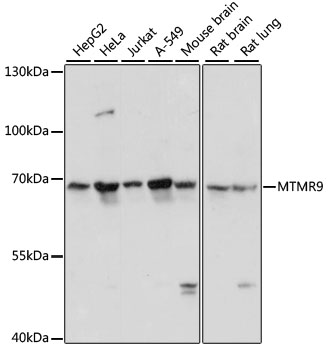-
Product Name
MTMR9 Polyclonal Antibody
- Documents
-
Description
Polyclonal antibody to MTMR9
-
Tested applications
WB
-
Species reactivity
Human, Mouse, Rat
-
Alternative names
MTMR9 antibody; C8orf9 antibody; LIP-STYX antibody; MTMR8 antibody; myotubularin-related protein 9 antibody
-
Isotype
Rabbit IgG
-
Preparation
Antigen: Recombinant fusion protein containing a sequence corresponding to amino acids 1-250 of human MTMR9 (NP_056273.2).
-
Clonality
Polyclonal
-
Formulation
PBS with 0.02% sodium azide, 50% glycerol, pH7.3.
-
Storage instructions
Store at -20℃. Avoid freeze / thaw cycles.
-
Applications
WB 1:1000 - 1:2000
-
Validations

Western blot - MTMR9 Polyclonal Antibody
Western blot analysis of extracts of various cell lines, using MTMR9 antibody at 1:3000 dilution.Secondary antibody: HRP Goat Anti-Rabbit IgG (H+L) at 1:10000 dilution.Lysates/proteins: 25ug per lane.Blocking buffer: 3% nonfat dry milk in TBST.Detection: ECL Basic Kit .Exposure time: 10s.
-
Background
Acts as an adapter for myotubularin-related phosphatases. Increases lipid phosphatase MTMR6 catalytic activity, specifically towards phosphatidylinositol 3,5-bisphosphate, and MTMR6 binding affinity for phosphorylated phosphatidylinositols. Positively regulates lipid phosphatase MTMR7 catalytic activity (By similarity). Increases MTMR8 catalytic activity towards phosphatidylinositol 3-phosphate. The formation of the MTMR6-MTMR9 complex, stabilizes both MTMR6 and MTMR9 protein levels. Stabilizes MTMR8 protein levels. Plays a role in the late stages of macropinocytosis possibly by regulating MTMR6-mediated dephosphorylation of phosphatidylinositol 3-phosphate in membrane ruffles. Negatively regulates autophagy, in part via its association with MTMR8. Negatively regulates DNA damage-induced apoptosis, in part via its association with MTMR6. Does not bind mono-, di- and tri-phosphorylated phosphatidylinositols, phosphatidic acid and phosphatidylserine.
Related Products / Services
Please note: All products are "FOR RESEARCH USE ONLY AND ARE NOT INTENDED FOR DIAGNOSTIC OR THERAPEUTIC USE"
